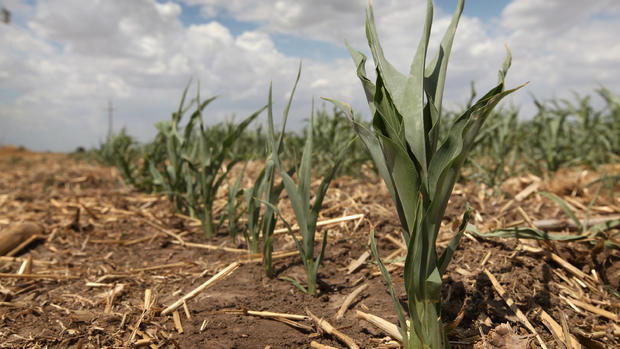Could the drought, heat bring energy blackouts?
(CBS News) When it's hot, as it has been at a record-setting pace this year across the U.S., just about anyone with an air conditioner cranks it up. However, the millions of energy-sucking devices all going on at once during the day is not the only thing straining the nation's power grid.
Nuclear, renewable and coal energy plants all have one thing in common: They need water - a lot of it - to cool down. And this year, there's also been a record-setting drought.
The last bad drought in 2008 saw some energy plants strained to the edge of being shut down, and at the drought's current pace - combined with the record temperatures - that could become a danger again.
The U.S. Drought Monitor map released Thursday showed that while there's been some ease in drought conditions across the continental U.S., 61.8 percent of the country is still experiencing some drought, and 24.1 percent is experiencing extreme or exceptional drought.
Farmers' crops may be drying up, but equally alarming should be the fact that, by some estimates, the energy sector in the U.S. consumes more water than the agricultural sector.
Report: Drought intensifies in key farming statesSome midwesterners find faucets running dry
Texas farmers using smartphones to manage drought
In a recent New York Times op-ed, Michael E. Webber, an assistant professor of mechanical engineering at the University of Texas, Austin, wrote: "About half of the nation's water withdrawals every day are just for cooling power plants. In addition, the oil and gas industries use tens of millions of gallons a day, injecting water into aging oil fields to improve production, and to free natural gas in shale formations through hydraulic fracturing."
While lack of water resources are a major problem for power suppliers, so is warm water. The Dominion Millstone nuclear power plant in Connecticut sent out a tweet on August 13 stating that warm water temperatures in the Long Island Sound caused them to temporarily shut down one of their reactors.
A Technology Review report claims that the Midwest has seen similar problems, with one fossil fuel plant reducing production because of high water temperatures, and another generator was shut off because of low water levels.
How far the nation is from sustained energy blackouts is unclear, but we are headed down that path. States with constant heat and drought issues, like California, may be a harbinger of what's to come. State officials there this week issued their second "flex alert," which warns citizens to dramatically curtail their energy consumption during daylight hours.
